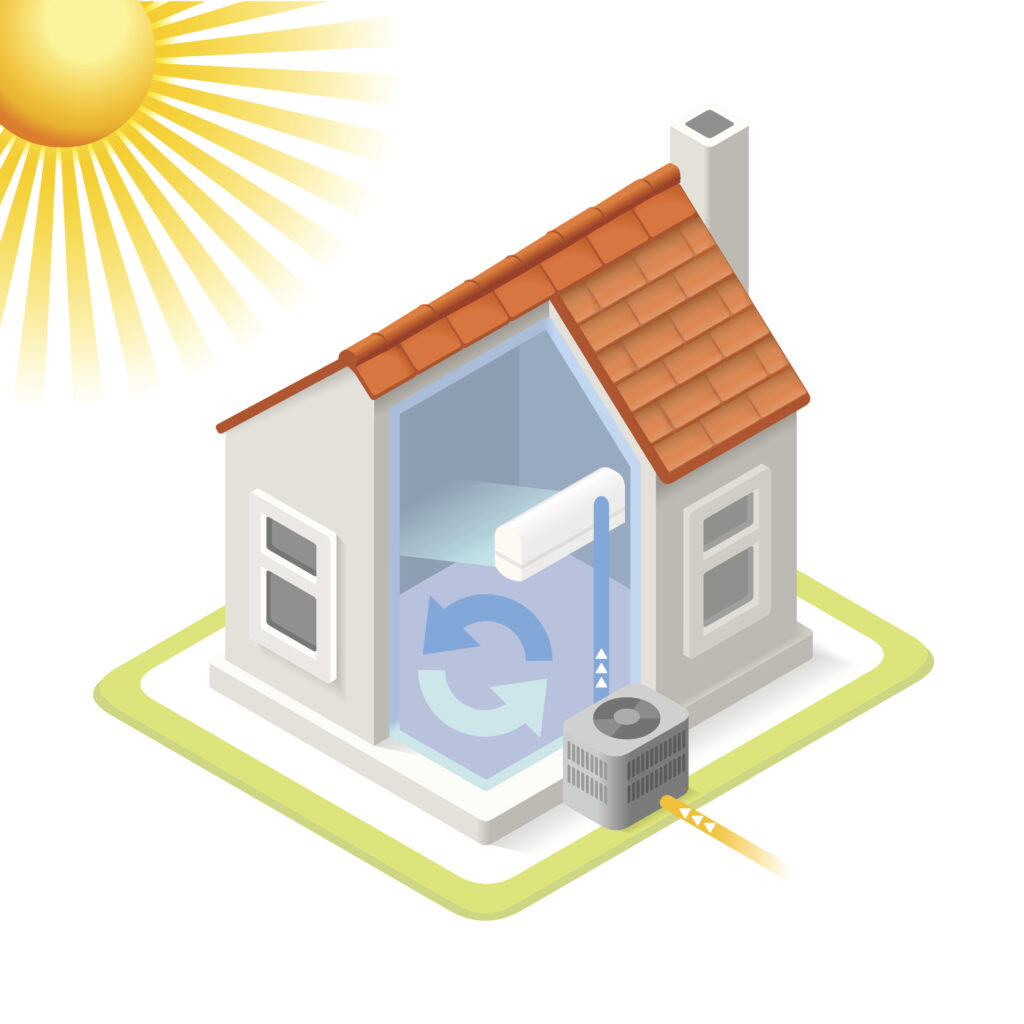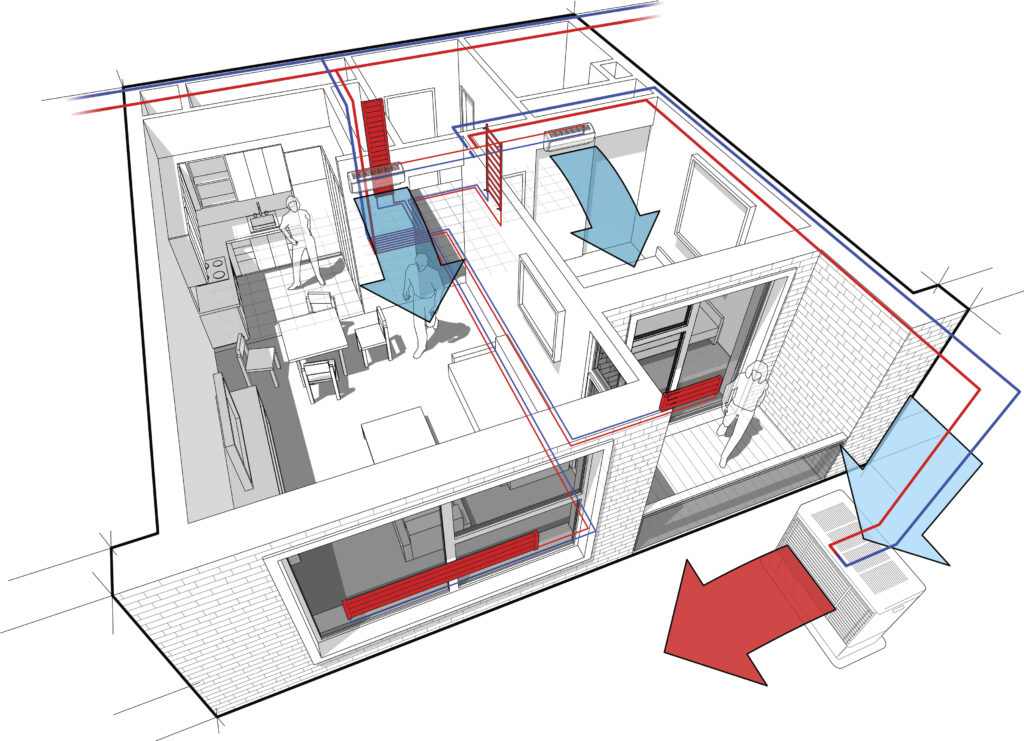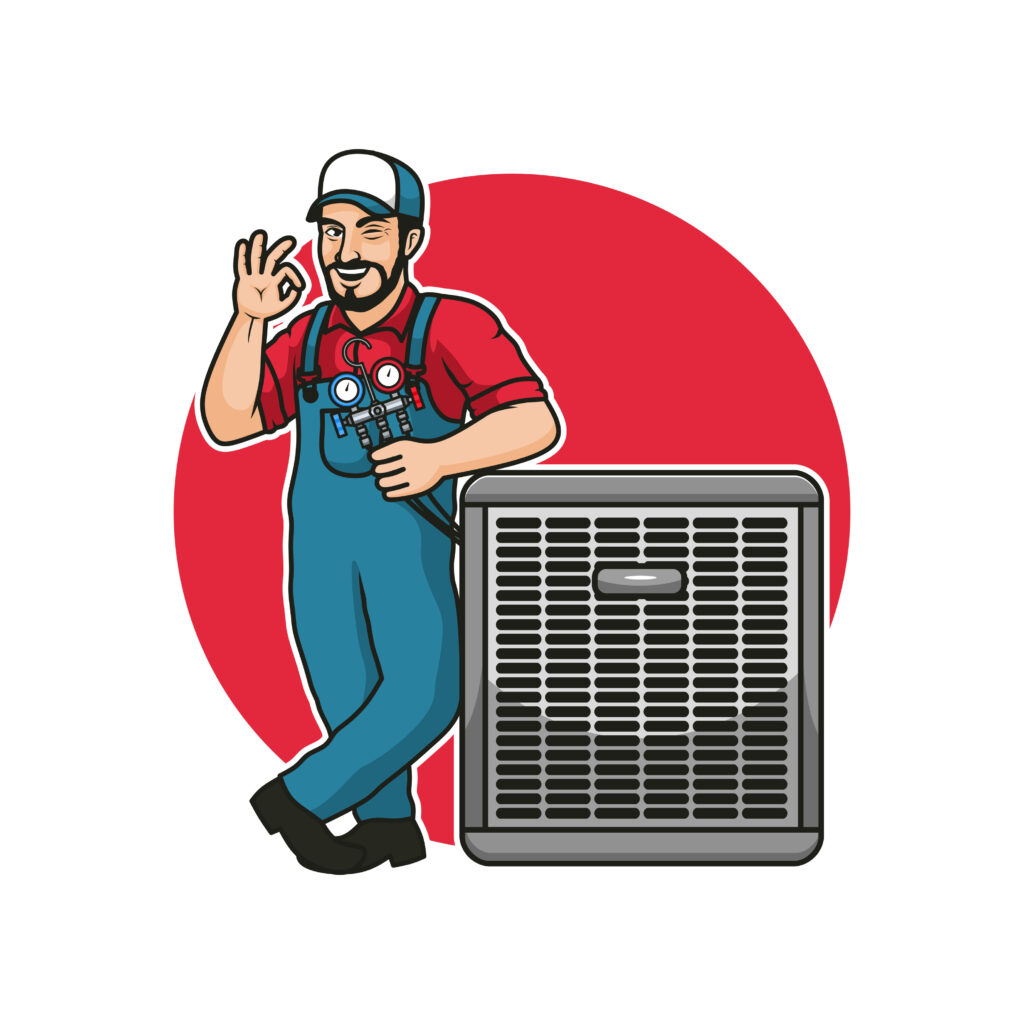
Residential HVAC System Components: A Comprehensive Guide
Have you ever wondered what keeps your home so comfortable, regardless of the weather outside?
It’s all about the magic happening behind the scenes with your residential HVAC system components. These components work tirelessly to ensure your home remains a sanctuary of comfort, whether it’s blistering hot or freezing cold outside.
In this article, we delve deep into the world of residential HVAC system components. You’ll gain insights into how these components function, their importance, and tips for maintaining an efficient system.
Whether you’re a new homeowner or looking to enhance your knowledge, this guide will equip you with the necessary information to understand and optimize your home’s HVAC system.

A Detailed Explanation of Residential HVAC System Components
Residential HVAC systems are intricate networks of components that collaborate to provide heating, ventilation, and air conditioning to your home. Understanding these components can help you maintain your system effectively, ensuring longevity and efficiency.

What are Residential HVAC System Components?
Residential HVAC system components are the individual parts that collaborate to provide heating, ventilation, and air conditioning in a home. These components are crucial in ensuring that your living environment remains comfortable, no matter the weather conditions outside.
At the heart of any residential HVAC system is the thermostat, which acts as the control center. It allows you to set your desired temperature and manages the overall operation of the HVAC system.
When you adjust your thermostat, you’re essentially communicating with the air handler and blower motor, which circulate air throughout your home. This circulation is vital for maintaining a consistent temperature in all rooms.
The system’s heating is typically achieved through a furnace or heat pump, which generates the necessary warmth. In contrast, cooling is provided by the air conditioner’s evaporator and condenser coils. These coils work in tandem to absorb indoor heat and release it outside, effectively lowering the indoor temperature.
Refrigerant plays a pivotal role in this heat exchange process. This fluid transitions between liquid and gas states within the HVAC system, absorbing and releasing heat as it circulates through the coils.
Ductwork is another essential component, forming the network through which heated or cooled air travels throughout your home. Properly designed and maintained ductwork ensures efficient and even distribution of air, preventing hot or cold spots in different rooms.
Additionally, residential HVAC systems often include air filters and indoor air quality systems to remove contaminants and improve the air you breathe. Advanced systems might also feature residential HVAC zoning, which allows different areas of your home to be heated or cooled independently, enhancing comfort and efficiency.
Energy-efficient HVAC solutions are increasingly popular, focusing on reducing energy consumption while maintaining optimal comfort. These systems, along with smart HVAC technologies, adapt to your habits and preferences, offering a seamless, automated approach to home climate control.
Understanding these components and their functions can significantly enhance your ability to maintain a comfortable and energy-efficient home, ensuring that your residential HVAC system operates smoothly throughout the year.
The Core Components of Residential HVAC Systems
Understanding the core components of residential HVAC system components is crucial for homeowners who want to maintain a comfortable living environment and ensure their system operates efficiently.
Let’s delve deeper into each component and its role in your home’s HVAC system.
The Thermostat: Your HVAC System’s Command Center
The thermostat stands as the pivotal control unit of your residential HVAC system, a fundamental component that dictates the overall performance and efficiency of your home’s heating and cooling.
Let’s explore the intricacies of this device and its paramount importance in regulating your home’s climate.
Central to Home Comfort
The thermostat’s primary function is to maintain the desired temperature set by you, the homeowner, ensuring that your living environment aligns with your comfort preferences.
It continuously monitors the temperature in your home, signaling the HVAC system to turn on or off to maintain the set climate conditions. This responsiveness to temperature variations is crucial for creating a consistently comfortable home environment.
Technological Advancements in Thermostats
Modern thermostats, particularly smart thermostats, have revolutionized how homeowners interact with their HVAC systems. These advanced devices offer programmable settings, allowing you to schedule temperature changes throughout the day, which is not only convenient but also energy-efficient.
For instance, you can set the thermostat to lower the heating or cooling when you’re not home and adjust it to a more comfortable level by the time you return.
Smart thermostats take this a step further by learning your schedule and preferences and making automatic adjustments to save energy while maintaining comfort.
They can be controlled remotely via smartphones, enabling you to manage your home’s climate from anywhere. Additionally, they provide valuable insights into your energy consumption patterns, helping you make informed decisions to optimize your HVAC system’s energy efficiency.
Impact on HVAC Efficiency and Home Comfort
The thermostat’s ability to precisely control the temperature has a significant impact on the overall efficiency of your HVAC system.
By ensuring that the system operates only when necessary, it prevents energy wastage, thereby reducing your utility bills. Moreover, a well-calibrated thermostat ensures that every room in your home reaches the desired temperature, enhancing the overall comfort level.
Air Handler and Blower Motor: Circulating Comfort
The air handler and blower motor are essential components of your residential HVAC system, playing a pivotal role in circulating air throughout your home. This section delves into how these components work together to ensure your home’s air is fresh, comfortable, and evenly distributed.
The Role of the Air Handler
The air handler ( one of the residential HVAC system components)is a central unit within your HVAC system, tasked with regulating and circulating air.
It’s essentially the hub where air is conditioned — either heated or cooled — before being distributed throughout your home. The air handler contains various critical components, including the blower motor, evaporator coil, and filter, all working in unison to ensure the air in your home is comfortable and clean.
Proper maintenance of the air handler is crucial. Regularly changing or cleaning the air filters, for example, not only ensures efficient operation but also improves your home’s indoor air quality systems. A well-maintained air handler contributes significantly to the overall efficiency and longevity of your HVAC system.
The Blower Motor: Driving Airflow
The blower motor, nestled within the air handler, is the driving force that propels air through the system.
It’s responsible for moving air across the evaporator coil for cooling and through the heat exchanger for heating, then pushing it out through the ductwork to various rooms in your home. The efficiency of the blower motor directly impacts the effectiveness of your HVAC system, influencing how quickly and evenly your home reaches the desired temperature.
Maintaining the blower motor involves regular inspections and cleaning, ensuring it operates at peak efficiency. A malfunctioning blower motor can lead to uneven temperature distribution, increased energy consumption, and undue strain on other HVAC components.
Enhancing Comfort and Efficiency
The synergy between the air handler and blower motor is vital for maintaining an even temperature throughout your home, which is essential for both comfort and energy efficiency.
When these components are well-maintained, they ensure effective airflow, reducing the strain on your system and prolonging its lifespan. This not only contributes to a more comfortable living environment but also optimizes your residential cooling systems and heating systems, leading to energy savings and reduced utility bills.
the air handler and blower motor are foundational to the functionality and efficiency of your HVAC system.
Regular maintenance and understanding of these components can significantly enhance the performance and longevity of your residential HVAC system components, ensuring a comfortable and energy-efficient home.
Evaporator and Condenser Coils: The Heat Exchange Duo
The evaporator and condenser coils (one of the residential HVAC system components) are integral to the functionality of your residential HVAC system, playing a critical role in the heating and cooling processes.
These coils work in tandem to ensure that your home maintains a comfortable temperature, regardless of the season. Let’s delve into the specifics of how these coils operate and their importance in your HVAC system.
The Evaporator Coil: Absorbing Heat
Located inside the air handler, the evaporator coil (one of the residential HVAC system components) is a crucial component in the cooling process of your HVAC system.
As warm air from your home passes over the coil, the refrigerant inside the coil absorbs the heat, effectively cooling the air. This cooled air is then circulated back into your home, lowering the indoor temperature.
The efficiency of the evaporator coil is vital for the overall performance of your HVAC system. When the coil is clean and free of debris, it can absorb heat more effectively, ensuring optimal cooling.
Regular maintenance, including cleaning and inspections, is essential to prevent issues such as freezing or reduced efficiency, which can occur if the coil is dirty or blocked.
The Condenser Coil: Releasing Heat
The condenser coil (one of the residential HVAC system components), located in the outdoor unit of your HVAC system, works in conjunction with the evaporator coil to release the absorbed heat outside your home.
After the refrigerant absorbs heat in the evaporator coil, it is compressed and sent to the condenser coil, where it releases the heat into the outdoor air.
The effectiveness of the condenser coil is crucial for the HVAC system’s ability to cool your home efficiently. Keeping the coil clean and ensuring that there is adequate space around the outdoor unit for air circulation are key factors in maintaining the system’s efficiency.
Regular checks and cleaning can prevent issues such as overheating or system inefficiency.
Maintaining Efficiency and Effectiveness
The performance of both the evaporator and condenser coils is essential for the efficient operation of your HVAC system.
Ensuring these coils are clean and well-maintained not only contributes to the system’s ability to provide comfortable indoor temperatures but also impacts energy consumption and longevity.
Regular maintenance and understanding of these components can significantly enhance the performance and efficiency of your residential HVAC system components, ensuring a comfortable and energy-efficient home environment.
Refrigerant: The Thermal Messenger
Refrigerant (one of the residential HVAC system components) plays a pivotal role in the functionality of your residential HVAC system, acting as the thermal messenger that carries heat in and out of your home. This section will explore the critical aspects of refrigerant and its significance in the heating and cooling processes.
The Role of Refrigerant in Heat Transfer
The refrigerant’s primary function within the HVAC system is to absorb and release heat, facilitating the transfer of thermal energy.
In the cooling cycle, the refrigerant absorbs indoor heat at the evaporator coil, transforming from a low-pressure gas to a high-pressure liquid. It then travels to the condenser coil, where it releases the absorbed heat to the outdoors, reverting to a gas.
This cycle is essential for maintaining the desired temperature within your home, making the refrigerant a crucial component of the HVAC system.
Types and Charge Levels of Refrigerant
Various types of refrigerants are used in HVAC systems, each with specific properties and applications. The choice of refrigerant affects the system’s efficiency, environmental impact, and compatibility with different components.
Additionally, the refrigerant’s charge level – the amount within the system – must be precisely maintained. An incorrect charge can lead to reduced efficiency, increased energy consumption, and potential damage to the system.
Regular checks by residential HVAC system components professionals ensure the refrigerant is at the optimal level for your system’s best performance.
Maintenance and Environmental Compliance
Proper handling and maintenance of the refrigerant are crucial for the HVAC system’s efficiency and environmental compliance.
Leaks can not only reduce the system’s efficiency but also harm the environment, especially if the refrigerant is one of the older types that contribute to ozone depletion or global warming.
Residential HVAC system components technicians use specialized equipment to detect leaks, repair them, and responsibly recharge the system with refrigerant.
The refrigerant is a key player in your HVAC system’s operation.
Regular maintenance, including leak checks and charge adjustments, is essential to ensure that your HVAC system remains efficient, effective, and environmentally friendly, providing comfortable indoor temperatures throughout the year.
Ductwork
Ductwork (one of the residential HVAC system components) is an essential component of your residential HVAC system, acting as the vascular system of your home’s heating and cooling. This network of tubes plays a critical role in distributing conditioned air throughout your living spaces, ensuring comfort in every corner.
Essential for Efficient Air Distribution
The primary function of ductwork is to transport heated or cooled air from the HVAC unit to various parts of your home.
Properly designed and installed ductwork is crucial for the efficient and even distribution of air. It ensures that every room reaches the desired temperature, enhancing the overall comfort and livability of your home.
When ductwork is well-designed, it minimizes the loss of energy, ensuring that your HVAC system operates at peak efficiency.
The Impact of Ductwork Condition
The condition of your ductwork (one of the residential HVAC system components) significantly impacts the efficiency of your HVAC system. Leaks, holes, or poor insulation in the ductwork can lead to substantial energy loss.
Conditioned air can escape before reaching its intended destination, forcing your HVAC system to work harder to maintain the set temperature. This not only increases your energy bills but also puts additional strain on your HVAC system, potentially reducing its lifespan.
Regular inspections and maintenance are vital to identify and rectify any issues with your ductwork.
Sealing leaks, repairing holes, and ensuring proper insulation can dramatically improve the efficiency of your system. This maintenance not only contributes to a more comfortable home environment but also promotes energy conservation and cost savings.
Enhancing Performance with Ductwork Maintenance
Maintaining your ductwork (one of the residential HVAC system components) is integral to the overall performance of your residential heating and cooling systems.
Regular maintenance checks can identify issues like blockages, leaks, or degradation, which can impact air quality and system efficiency. Addressing these issues promptly ensures that your HVAC system delivers optimal performance, providing consistent temperature control and improving indoor air quality.
By understanding and maintaining the ductwork in your residential HVAC system, you can enhance the system’s effectiveness, reduce energy consumption, and ensure a comfortable and healthy living environment for you and your family.
Maintenance and Efficiency: Ensuring Peak Performance
Regular maintenance is crucial for the optimal performance of your residential HVAC system components. It’s the cornerstone of efficiency, longevity, and reliability in your heating and cooling system.
Let’s delve into the aspects of maintenance that are vital for keeping your HVAC system running smoothly.
Routine Checks: The First Line of Defense
Routine checks are essential for the early detection of potential issues that could impair the efficiency and effectiveness of your HVAC system. These checks can identify wear and tear, component malfunctions, and other issues before they escalate into more significant problems.
Regular inspections can include checking the thermostat settings, examining electrical connections, lubricating moving parts, and inspecting the condensate drain for blockages. These preventive measures can save you from unexpected breakdowns and costly repairs.
Filter Replacements: Breathing Life into Your System
One of the simplest yet most impactful maintenance tasks is replacing or cleaning the HVAC filters.
Dirty filters restrict airflow, forcing your system to work harder, which can lead to increased energy consumption and reduced system lifespan. Regular filter changes not only enhance the efficiency of your HVAC system but also improve indoor air quality, making your home a healthier environment.
Professional Inspections: Expert Eyes on Your System
While routine checks and filter replacements can be handled by most homeowners, professional inspections are crucial for a comprehensive assessment of your HVAC system’s health.
HVAC professionals have the tools, knowledge, and experience to thoroughly inspect your system, identify issues that may not be apparent to the untrained eye, and perform necessary repairs or adjustments. These inspections can ensure that your system is operating at peak efficiency and can often extend the lifespan of your HVAC components.
The Impact of Efficient Systems
Efficient HVAC systems not only provide better comfort by maintaining consistent temperatures and humidity levels but also reduce energy consumption.
Lower energy consumption translates to reduced utility bills and a smaller carbon footprint, aligning with energy-efficient HVAC solutions and sustainable living practices. Moreover, efficient systems are less likely to experience breakdowns, reducing the need for emergency repairs and extending the overall lifespan of your HVAC system.
Regular maintenance ensures that your residential HVAC system components are not only functioning correctly but are also optimized for energy efficiency, cost-effectiveness, and environmental sustainability.
Understanding System Upgrades for Your Residential HVAC System
Upgrading your residential HVAC system is a significant decision that can enhance your home’s comfort, improve energy efficiency, and potentially increase your property’s value.
Knowing when to upgrade and how to choose the right system is crucial for maximizing these benefits.
When to Consider an HVAC System Upgrade
Age of the System
If your HVAC system is over 10 years old, it may not be as efficient as newer models. Older systems are more prone to breakdowns and may not provide the level of comfort you expect.
Frequent Repairs: As HVAC systems age, they may require more frequent repairs. If you find yourself calling for service more often than usual, it might be more cost-effective in the long run to invest in a new system.
Increasing Energy Bills
An increase in your energy bills could indicate that your HVAC system is losing efficiency. Newer systems have higher energy efficiency ratings, which can significantly reduce your monthly bills.
Inconsistent Comfort Levels
If some rooms are too hot while others are too cold, your system might be failing to distribute air properly. A new system can provide consistent comfort throughout your home.
Choosing the Right HVAC System
Size Matters
It’s essential to choose an HVAC system that’s appropriately sized for your home. A system that’s too large will cycle on and off too frequently, reducing efficiency and lifespan. Conversely, a system that’s too small won’t adequately heat or cool your home.
Energy Efficiency
Look for systems with high SEER (Seasonal Energy Efficiency Ratio) and HSPF (Heating Seasonal Performance Factor) ratings. Higher ratings mean more energy efficiency and lower operating costs.
Advanced Features
Modern HVAC systems come with features like variable speed blowers, smart thermostat compatibility, and zoning capabilities. These features can enhance comfort and efficiency.
Professional Guidance
Consulting with residential HVAC system components professionals is crucial. They can perform a detailed assessment of your home’s heating and cooling needs, recommend the right system size, and suggest models that fit your budget and efficiency requirements.

Professional HVAC Services: When to Call the Experts
Utilizing professional HVAC services is essential for maintaining the optimal performance and longevity of your residential HVAC system components.
Knowing when to call in the experts can save you time, and money, and ensure your system operates efficiently year-round.
Annual Inspections: The Foundation of HVAC Maintenance
Preventive Maintenance
Annual inspections by residential HVAC system components professionals are crucial for identifying and addressing minor issues before they escalate into major problems. These inspections typically include checking system components, cleaning air filters, and ensuring the system operates efficiently.
System Optimization
During an inspection, residential HVAC system components technicians can optimize your system’s settings for enhanced efficiency and comfort. They can also provide valuable advice on maintaining your system between visits.
Longevity and Efficiency
Regular professional maintenance can extend the lifespan of your HVAC system and ensure it runs at peak efficiency, reducing energy consumption and lowering utility bills.
Repairs: Addressing Issues Promptly
Unusual Noises or Smells
Strange sounds or odors emanating from your HVAC system can indicate underlying issues. A prompt professional assessment can prevent minor issues from developing into more significant problems.
Performance Decline
If you notice a decrease in your system’s heating or cooling efficiency or if it struggles to maintain the set temperature, it’s time to call in the experts. They can diagnose and fix the problem, restoring your system’s performance.
Expertise and Equipment
Residential HVAC system components professionals have the expertise and specialized tools to diagnose and repair complex system issues, ensuring repairs are done correctly and safely.
Enhancing Indoor Air Quality in Your Home
Improving the indoor air quality (IAQ) in your home is crucial for the health and comfort of its occupants.
Integrating air purifiers and humidity control devices like humidifiers and dehumidifiers into your residential HVAC system can significantly enhance the air quality, contributing to a healthier and more comfortable living environment.
Air Purifiers: Your Allies Against Contaminants
Air purifiers (one of the residential HVAC system components) are essential devices that integrate with your HVAC system to cleanse your indoor air of pollutants, allergens, and other harmful particles. They work by pulling air through filters, trapping contaminants, and circulating clean air back into your living spaces.
Types of Air Purifiers
There are various air purifiers available, including HEPA filters, which can capture up to 99.97% of particles, and activated carbon filters, which are effective against odors and gasses.
Benefits:
By removing dust, pollen, pet dander, and other allergens, air purifiers can alleviate allergy and asthma symptoms, enhance sleep quality, and improve overall health.
Regularly replacing or cleaning the filters in your air purifier is crucial to maintain its effectiveness and ensuring your HVAC system operates efficiently.
Humidifiers and Dehumidifiers: Balancing Indoor Humidity
Maintaining the right humidity level is vital for comfort and health. Humidifiers add moisture to the air in dry climates, while dehumidifiers remove excess moisture in more humid conditions.
Humidifiers
In dry climates or during winter, humidifiers can prevent issues like dry skin, irritated airways, and static electricity. They can also make the air feel warmer, potentially reducing heating needs.
Dehumidifiers
In humid climates or during summer, dehumidifiers help prevent mold growth, pest infestations, and musty odors. They also make the air feel cooler, which can reduce the reliance on air conditioning.
Optimal Humidity Levels
The ideal indoor humidity level is between 30% and 50%. Maintaining this range can enhance respiratory health, protect wooden furniture from warping, and improve overall indoor comfort.
By incorporating air purifiers, humidifiers, and dehumidifiers into your residential HVAC system, you can significantly improve the air quality in your home.
These enhancements not only contribute to a healthier living environment but also optimize the efficiency and effectiveness of your HVAC system, ensuring it provides the best possible comfort for your home.
Smart HVAC Technologies: Enhancing Comfort and Efficiency
Incorporating smart technologies into your residential HVAC system can significantly enhance its efficiency and your home’s comfort. Two key innovations in this area are smart thermostats and HVAC zoning systems.
Let’s delve into how these technologies work and their benefits.
Smart Thermostats: Intelligent Climate Control
Learning Your Habits
Smart thermostats go beyond programmable settings; they learn your schedule and preferences over time. By adapting to your lifestyle, they can automatically adjust the temperature to suit your needs, whether you’re home, asleep, or away.
Energy Savings
By optimizing your HVAC system’s operation based on your actual habits and preferences, smart thermostats can significantly reduce energy consumption. This not only lowers your utility bills but also reduces your carbon footprint.
Remote Control
With a smart thermostat, you can control your home’s climate from anywhere using a smartphone or tablet. This convenience allows you to make adjustments on the go, ensuring you return to a comfortable home.
Maintenance Alerts
Many smart thermostats can detect issues with your HVAC system and remind you of regular maintenance tasks, like changing the air filter, and ensuring your system remains efficient and effective.
HVAC Zoning Systems: Customized Comfort
Individual Zone Control
HVAC zoning systems allow you to divide your home into different zones, each with independent temperature control. This means you can heat or cool specific areas of your home as needed, which is particularly useful for multi-story homes or areas with varying exposure to sunlight.
By only heating or cooling areas that are in use, zoning systems reduce unnecessary energy consumption, leading to lower energy bills and a more environmentally friendly home.
Enhanced Comfort
Zoning eliminates the problem of uneven temperatures throughout your home, allowing each zone to be customized for optimal comfort.
Whether it’s a chilly basement or a warm upper level, each area can be adjusted to suit the preferences of its occupants.
Integration with Smart Thermostats
Combining zoning systems with smart thermostats can further enhance the efficiency and comfort of your home. This integration allows for precise control over each zone, with the added benefits of learning capabilities and remote access.
By integrating smart HVAC technologies like smart thermostats and zoning systems into your residential HVAC system, you can achieve a new level of comfort and efficiency. These technologies not only cater to your specific needs but also contribute to energy conservation and cost savings, aligning with modern demands for smart, efficient, and responsive home systems.
Top 5 Best Practices for Residential HVAC System Components
Understanding and maintaining your residential HVAC system is crucial for ensuring efficiency, longevity, and comfort.
Here are best practices sourced from reputable residential HVAC system components experts to help you optimize your system.
1. Embrace Regular System Evaluations and Updates
Trane emphasizes the significance of regular HVAC system evaluations and updates. These practices are not just about fixing problems but also about identifying opportunities to enhance system efficiency and indoor comfort.
Regular check-ups can detect inefficiencies or minor issues before they escalate, ensuring your system operates optimally year-round.
2. Educate Yourself as a New Homeowner
For first-time homeowners, understanding the basics of HVAC systems is vital. Modernize suggests that new homeowners should familiarize themselves with their system’s components and maintenance requirements.
This knowledge empowers homeowners to make informed decisions about their HVAC systems, ensuring they are maintained properly and operate efficiently.
3. Deep Dive into residential HVAC system components
Knowing how to keep these components running efficiently can prevent costly repairs and extend the system’s lifespan, ultimately saving money and enhancing home comfort.
4. Leverage Professional Expertise
While DIY maintenance can be effective for minor issues, leveraging professional HVAC services for annual inspections or complex repairs can significantly benefit your system’s efficiency and durability.
Residential HVAC system components professionals can provide a more thorough examination and address issues beyond the scope of typical homeowner maintenance.
5. Implement Energy-Efficient Practices
Incorporating energy-efficient practices, such as upgrading to a smart thermostat or ensuring your home is properly insulated, can greatly enhance your HVAC system’s performance. These practices not only contribute to a more comfortable living environment but also reduce energy consumption and lower utility bills.
By integrating these strategies and tips into your approach to HVAC maintenance and care, you can ensure that your residential HVAC system remains a reliable source of comfort and efficiency in your home.
One Hour Air Conditioning & Heating of Dallas: Your Go-To Residential HVAC System Components Experts
One Hour Air Conditioning & Heating of Dallas stands out as a premier provider of HVAC services, catering to a wide range of needs for residents in the Dallas area and its surrounding cities.
Their expertise in residential HVAC system components ensures your system receives the best care, whether it’s routine maintenance, emergency repairs, or a full system installation.
Comprehensive HVAC Services in Dallas
Installation Excellence
Whether you’re installing a new HVAC system or replacing an old one, One Hour Air Conditioning & Heating of Dallas offers top-notch residential HVAC system components services. They ensure that your new system is correctly sized and efficiently installed, providing optimal comfort and energy efficiency for your home.
Maintenance and Repairs
Regular maintenance is crucial for the longevity and efficiency of your HVAC system. One Hour Air Conditioning & Heating provides thorough maintenance checks, including filter replacements, system inspections, and cleaning, to keep your system running smoothly.
Their repair services are equally commendable, addressing issues promptly to restore your home’s comfort.
Serving the Greater Dallas Area
With a focus on the Dallas region, including Addison, Allen, Carrollton, and other nearby locations, One Hour Air Conditioning & Heating ensures that expert residential HVAC system components expertise help is never too far away.
Their local presence means faster response times and a deep understanding of the specific HVAC needs of Dallas-area residents.

Why Choose One Hour Air Conditioning & Heating of Dallas?
Customer Satisfaction
Their commitment to customer satisfaction is evident in their reviews and ratings. Check out their feedback to understand why they’re a trusted choice for HVAC services in the Dallas area.
Availability
Understanding that HVAC issues can arise unexpectedly, One Hour Air Conditioning & Heating offers round-the-clock availability to address your urgent needs promptly.
Professional Expertise
With a team of skilled technicians, One Hour Air Conditioning & Heating ensures that every service call is handled with the utmost professionalism and expertise, whether it’s a routine check-up or an emergency repair.
For residents in Dallas and its surrounding areas looking for reliable and efficient HVAC services, One Hour Air Conditioning & Heating of Dallas, TX is a top choice.
Their comprehensive services, focus on customer satisfaction, and local expertise make them a trusted partner for all your HVAC needs. For professional residential HVAC system components assistance, don’t hesitate to call them at # 469-598-0524.

FAQs on Residential HVAC System Components
-
What are the essential residential HVAC system components?
The essential components include the thermostat, air handler, blower motor, evaporator and condenser coils, refrigerant, and ductwork. Each plays a vital role in ensuring your home’s comfort.
-
How often should residential HVAC system components be professionally inspected?
Professional inspections of your residential HVAC system components should ideally occur at least once a year.
-
What are the signs that my HVAC system may need repairs or replacement?
Signs that your HVAC system may need attention include unusual noises, inconsistent temperatures, increased energy bills, and frequent cycling on and off.
-
Can upgrading my thermostat improve my HVAC system’s efficiency?
Yes, upgrading to a smart thermostat can significantly improve your HVAC system’s efficiency. Smart thermostats can learn your schedule and preferences, making automatic adjustments to save energy while maintaining comfort.
-
What is the importance of ductwork maintenance in HVAC system efficiency?
Ductwork maintenance is crucial for HVAC system efficiency because leaks, holes, or poor insulation can lead to significant energy loss.
Properly sealed and insulated ductwork ensures that air is distributed evenly and efficiently throughout your home, preventing your HVAC system from overworking and leading to increased energy bills.
What are your thoughts on the latest advancements in residential HVAC system components?







